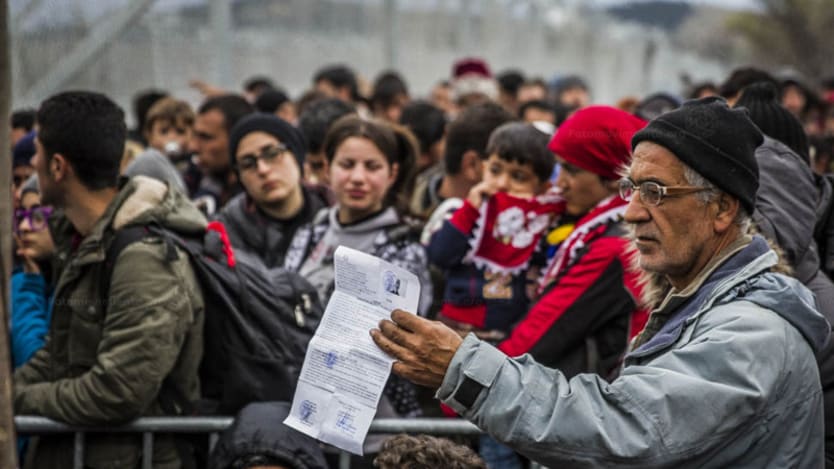
Europe is facing its largest refugee crisis since World War II. The influx of people on the European Union's southern and southeastern sea borders is stretching the resources and capabilities of both the member states directly concerned, but also of the EU as a whole.
While the politics of this crisis can be passionate or divisive, on one thing almost everyone agrees: There is a humanitarian imperative to help people, wherever they are — in their countries of origin, on the road, or already in Europe. The EU's humanitarian action is engaged on all these fronts.
There are many challenges in helping refugees, asylum-seekers and migrants coming to Europe, but if we talk about their home countries probably access would be the biggest one. Facilitating humanitarian actors’ access to affected people is the fundamental precondition of humanitarian relief. However, the nature of conflicts has led to increased attacks on humanitarian personnel and theft of assets, especially inside Syria and Iraq.
Consequently, many affected areas have turned into no-go zones for humanitarian workers. As a result, vulnerable populations are routinely denied access to aid. Even so, the EU, its institutions and member states have already allocated over 5 billion euros ($5.51 billion) to alleviate the suffering stemming from the Syrian crisis, funding humanitarian projects both inside the country and in neighboring countries. A further 3 billion euros has been pledged by the EU at the recent donors conference in London in February.
Helping refugees in transit countries has its challenges too. Since the beginning of the refugee crisis in Europe in 2015, the EU has provided humanitarian aid amounting to over 22.5 million euros to the western Balkans, notably to Serbia and the former Yugoslav Republic of Macedonia. Since the beginning of the Syria crisis, the European Commission has also provided total assistance of 365 million euros in Turkey, including humanitarian aid and longer-term assistance. And towards the end of 2015, the EU set up a joint framework — a refugee facility for Turkey — to deliver efficient and complementary support to refugees in Turkey. It coordinates a total amount of 3 billion euros, coming from EU institutions and member states, which is now being rolled out.
We need to help people also when they arrive in Europe: We cannot watch a humanitarian disaster evolve within our own borders. On March 2, the European Commission proposed an Emergency Assistance Instrument to be used within the EU to provide a faster, more targeted response to major crises with humanitarian impact. The initiative comes as the refugee crisis reaches an unprecedented scale, with the need to provide immediate emergency support in several member states hosting large amounts of refugees on their territories. Emergency assistance under the new instrument will complement ongoing efforts by the respective member states. It will be delivered by United Nations agencies, nongovernmental organizations and international organizations in close coordination with the member state concerned.
“Only sustained and concerted European action based on genuine solidarity will see us through this crisis.”
— Monique Pariat, director general of the European Commission's Humanitarian Aid and Civil Protection departmentAid will address basic necessities such as food, shelter and medicine to the large numbers of children, women and men currently arriving in EU countries. A budget of 700 million euros was proposed for the next three years, with 300 million euros already earmarked for 2016. The instrument aims at providing a needs-based emergency response, complementing and supplementing the response already on the ground.
The proposal is filling a gap, as existing instruments at EU level are not designed to address humanitarian needs within the territory of the EU. While the EU Civil Protection Mechanism has been used to mobilize material support within the EU, it relies on voluntary offers of in-kind assistance from member states and does not provide funding.
However, let me be clear: there is no silver bullet. While a much-needed tool in the EU emergency response toolbox, the new instrument does not replace existing action or instruments. We need to keep mobilized at all levels, in the member states and at European level.
The EU is facing challenges, but we are also putting forward solutions. To serve people in need, wherever they are. One thing, I know with certainty: Only sustained and concerted European action based on genuine solidarity will see us through this crisis.
Across Borders is a monthlong online conversation hosted by Devex and partners — World Vision, the European Commission's Humanitarian Aid and Civil Protection department, the U.S. nonprofit partner of the International Organization for Migration and United Nations Volunteers — to analyze and amplify the discussion on global migration and current refugee crises through the lens of global security, development cooperation and humanitarian aid work, and more. Visit the campaign site and join the conversation on social media tagging @devex and #AcrossBorders.








